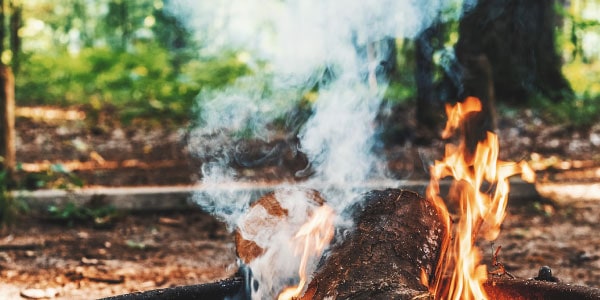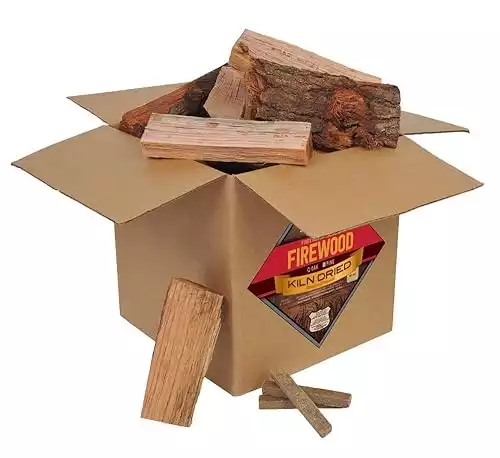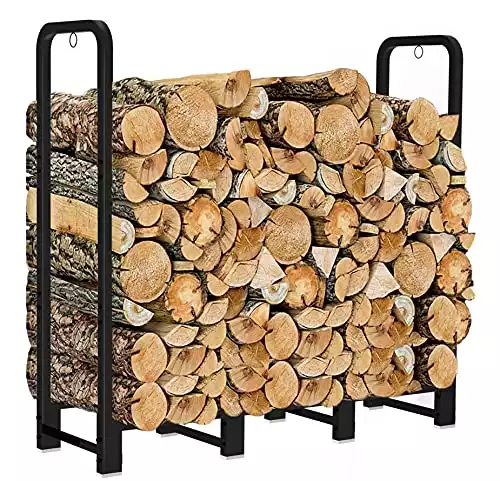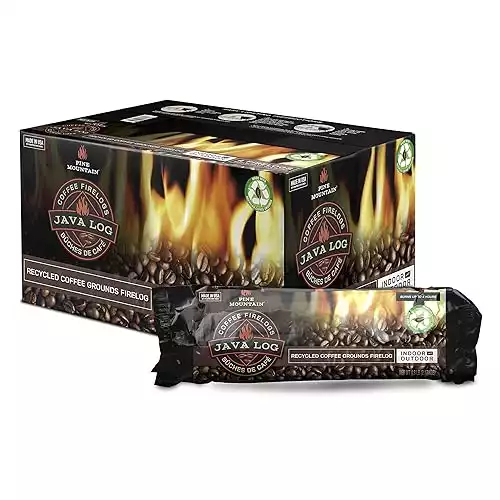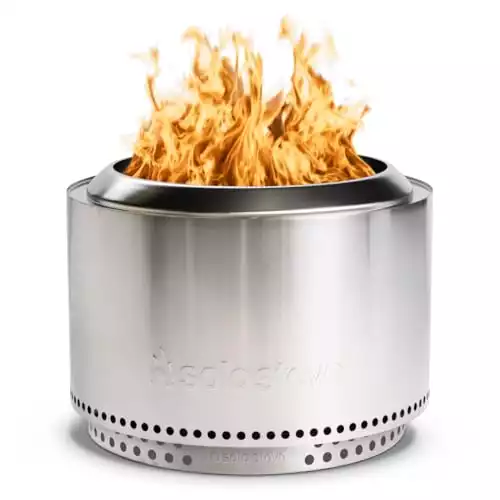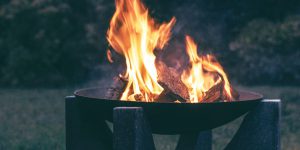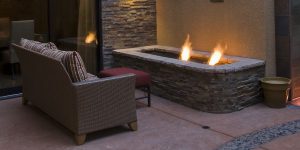

Owning a fire pit comes with common hazards and annoyances. Not only do they get extremely hot, but they can produce a lot of fire pit smoke.
Many people often wonder: why does my fire pit smoke so much? Well, fire pit smoke can be caused by a few factors, namely:
- Not using the right type of wood (i.e. too high sap content)
- Using wood that hasn’t been seasoned properly (i.e. has too high a moisture content)
- Poor airflow (i.e. obstructions from left over ash or blocked sides)
- Not cleaning your fire pit properly (i.e. debris or marshmallows left over from last time)
However, the good news for you is that there are ways in which you can reduce fire pit smoke dramatically, making your outdoor experience less smokey and more enjoyable for everyone, you and your neighbours included.
Best ways to minimize smoke from a fire pit
Our top tips to reduce fire pit smoke in your typical wood-burning fire pit include:
- Seasoned Wood: Use seasoned wood or kiln dried firewood
- Keep It Clean: Clean your fire pit after every use
- Keep It Dry: Keep your wood dry by storing it properly
- Do It Right: Don’t burn the wrong things
- Airflow: Ensure you have adequate airflow to prevent smoke
- Control Wind Exposure: Place the fire pit in a sheltered area or use a wind guard.
1. Use seasoned wood or kiln-dried firewood
Seasoned wood is wood that has been stored so that it can air dry naturally and reduce its moisture content. Typically it can take around 6 – 12 months to season green wood (freshly cut wood). You can either buy seasoned wood or season it yourself, whatever you prefer, have the budget, or have time for. Using seasoned wood means less moisture in your wood, which will mean a better burn and produce less smoke than wood with high moisture content.
An alternative to seasoned wood is Kiln dried wood. This type of wood has been dried in a kiln. It takes less time to dry and can have a lower moisture content than seasoned wood. It’s excellent for kindling and getting a fire started quickly.
Whichever direction you choose, be sure to source hardwoods like Oak, as they are denser, making them burn longer, cleaner, with a higher heat output, and of course, less smoke.
Smoak Firewood offers USDA certified, organic, kiln-dried premium oak, free from chemicals. Ready to burn, it’s perfect for heating and cooking. Delivered to your door, fits Solo Stove, and made in the USA.
2. Clean your fire pit after every use
Getting into a regular fire pit maintenance routine is one habit that can help prevent your fire pit from smoking the next time you use it.
Cleaning out the debris of fallen marshmallows, leftover ash from the last burn, leaves, and other random objects that might have fallen victim to your fire pit will help it from smoking in the future.
This is all the more important if you’ve been using your fire pit as a bbq. Leftover grease, veggies, and food particles can increase the smoke in your pit if not cleaned out before firing it back up.
You can do this before using it or after putting out your last fire. Just be careful of the hot ash that might be present and the hot metal of your pit if you decide to do it after using it.
3. Keep your wood dry by storing it properly
Once you’ve bought your seasoned wood or green wood to dry out, you’ll want to ensure that it doesn’t get wet, as this will increase the moisture in the wood, leading to more smoke.
Storing your wood correctly can be done inside, but more often than not, you can buy firewood log storage or wood stores to help hold your firewood correctly. They typically keep your wood off the ground, come with a roof to keep the rain off, and some even come with covers to protect from harsher weather during storms and winter.
There are many available to buy online or in your local garden centers, ranging in price depending on how much wood you want to store, where you want to keep it, and how much protection you want it to have.
They can be a nice addition to a garden or next to your fireplace indoors.
Related: Take a look at some of the best ways to store firewood outside
4. Don’t burn the wrong things
A fire pit is not only great for heating your garden space but is also great for roasting marshmallows or hot dogs. However, it would be best if you did not use them to dispose of your leftover napkins, cardboard, paper, or other burnable material other than the hardwood fuel source.
Burning other materials will cause excessive smoke and, depending on the material, could potentially release harmful chemicals or substances into the air. Stick to your seasoned firewood or kiln-dried logs to make for a reduced smoke experience that will let you breathe a little easier.
5. Make sure your fire has adequate airflow
Building your fire pit the right way, from kindling to adding logs on top, will ensure that the wood burns at its best, reducing the amount of smoke given off. The more oxygen your fire has will make it burn hotter, giving off more heat and burning your wood more efficiently, helping limit the smoke even further.
The best way to build your fire is to ensure gaps between your kindling, not apply too much tinder, and stack your firewood to ensure you can still see the flame underneath. Don’t overload your pit; make sure your fire has plenty of air to breathe, and you’ll have a more efficient fire.
6. Control Wind Exposure
Even though you need airflow to keep a fire burning, too much wind can push smoke into the air surrounding the fire pit making it an unpleasant experience for everyone around. To solve this you’re going to want to reduce wind interference by:
- Placing your fire pit in a sheltered location
- Using a fire pit wind guard
- Adjusting the stacking method to account for wind direction.
- Dry pine cones – Easily combustible and readily available
- Cotton balls soaked in wax – Burn longer and create a steady flame
- Dried citrus peels – Not only do they ignite well, but they also release a pleasant scent as they burn
Bonus Tip: Use Natural Accelerants for Cleaner Fires
When it comes to getting your fire off to a roaring start, instead of heading straight to the lighter fluid, which produces smoke and harmful fumes, perhaps give these natural accelerants a chance. Not only do they burn cleaner they help keep your fire pit a little more eco friendly.
Don’t forget to put out your fire pit safely when you’ve finished using it to avoid causing lasting damage and prevent fires.
Is there an eco-friendly smoke-free alternative to seasoned wood?
If you’re after an eco-friendly way to keep your fire pit going, then you could use coffee logs. However, even though these contain less moisture than your typical wet wood, they still smoke more than properly seasoned wood.
Unfortunately, this means that they aren’t a smokeless fuel source for your standard fire pit.
The Java Log is an eco-friendly firelog made from recycled coffee grounds, burning cleaner, hotter, and longer than wood, with fewer emissions. It's easy to light, burns for 4 hours, and is made from renewable resources.
Are there smoke free fire pits?
If you’ve got a standard metal fire pit bowl or typical fire pit, consider upgrading to a smokeless fire pit. These aren’t 100% smokeless but do help reduce the amount of smoke given off by the fuel you are burning dramatically as their design reburns the smoke before it leaves the top of the pit.
This design makes smokeless fire pits more efficient, leaving behind less ash to clean up and using less fuel, saving you cash on the amount you need to spend on firewood each month or year.
Popular smokeless fire pits include the Solo Stove with its sleek double-walled stainless steel design, but many alternatives are available to fit your budget.
Enjoy smokeless fires with the Solo Stove Yukon 2.0, crafted from durable stainless steel. Portable, easy to clean, and perfect for camping or backyard gatherings. Stylish, long-lasting, and hassle-free.
Summing up
By reading this, you’ve learned a few ways and tips on how to reduce fire pit smoke when using your fire pit outdoors.
Remember to use seasoned hardwood or kiln-dried logs, keep your pit clean, don’t burn anything else, and of course, store your wood properly, keeping it as dry as it can be.
Stick to these tips the next time you use your fire pit, and you’ll be sure to see the benefits: less smoke and higher heat, and longer burn.
FAQs
Why does my fire pit produce so much smoke?
Excessive smoke can occur due to wet wood, poor airflow, or burning the wrong type of wood. Moisture in the wood, low-quality wood, and restricted airflow contribute to a smoky fire.
How can I reduce smoke when using a fire pit?
To reduce smoke, use dry seasoned hardwoods, ensure proper airflow by arranging the wood loosely, and avoid burning materials like paper or wet wood, which can cause excessive smoke.
What types of firewood create less smoke?
Hardwoods like oak, maple, hickory, and cherry produce less smoke than softwoods like pine. Hardwoods burn hotter, more efficiently, and with less smoke, making them ideal for a cleaner fire.
How can I improve airflow in my fire pit?
Ensure the fire pit has adequate ventilation holes for air circulation. Elevate the wood using a log grate, and avoid overcrowding the pit to allow proper airflow, reducing smoke.
Does using a fire pit cover help reduce smoke?
No, a fire pit cover is meant to protect your fire pit from rain and debris. To reduce smoke, focus on using dry wood, improving airflow, and managing your fire’s fuel and fuel type.




